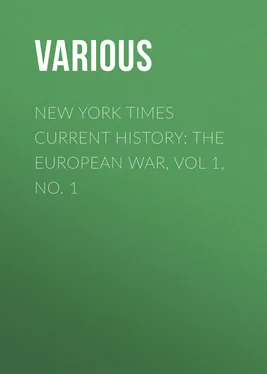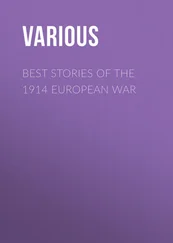Various - New York Times Current History - The European War, Vol 1, No. 1
Здесь есть возможность читать онлайн «Various - New York Times Current History - The European War, Vol 1, No. 1» — ознакомительный отрывок электронной книги совершенно бесплатно, а после прочтения отрывка купить полную версию. В некоторых случаях можно слушать аудио, скачать через торрент в формате fb2 и присутствует краткое содержание. Жанр: foreign_edu, periodic, История, на английском языке. Описание произведения, (предисловие) а так же отзывы посетителей доступны на портале библиотеки ЛибКат.
- Название:New York Times Current History: The European War, Vol 1, No. 1
- Автор:
- Жанр:
- Год:неизвестен
- ISBN:нет данных
- Рейтинг книги:4 / 5. Голосов: 1
-
Избранное:Добавить в избранное
- Отзывы:
-
Ваша оценка:
- 80
- 1
- 2
- 3
- 4
- 5
New York Times Current History: The European War, Vol 1, No. 1: краткое содержание, описание и аннотация
Предлагаем к чтению аннотацию, описание, краткое содержание или предисловие (зависит от того, что написал сам автор книги «New York Times Current History: The European War, Vol 1, No. 1»). Если вы не нашли необходимую информацию о книге — напишите в комментариях, мы постараемся отыскать её.
New York Times Current History: The European War, Vol 1, No. 1 — читать онлайн ознакомительный отрывок
Ниже представлен текст книги, разбитый по страницам. Система сохранения места последней прочитанной страницы, позволяет с удобством читать онлайн бесплатно книгу «New York Times Current History: The European War, Vol 1, No. 1», без необходимости каждый раз заново искать на чём Вы остановились. Поставьте закладку, и сможете в любой момент перейти на страницу, на которой закончили чтение.
Интервал:
Закладка:
Various
New York Times Current History: The European War, Vol 1, No. 1 / From the Beginning to March, 1915
NUMBER I.
WHAT MEN OF LETTERS SAY
"Common Sense About the War"
I
" Let a European war break out—the war, perhaps, between the Triple Alliance and the Triple Entente, which so many journalists and politicians in England and Germany contemplate with criminal levity. If the combatants prove to be equally balanced, it may, after the first battles, smoulder on for thirty years. What will be the population of London, or Manchester, or Chemnitz, or Bremen, or Milan, at the end of it ?" ("The Great Society," by Graham Wallas. June, 1914.)
( Copyright, 1914, By The New York Times Company. )
The time has now come to pluck up courage and begin to talk and write soberly about the war. At first the mere horror of it stunned the more thoughtful of us; and even now only those who are not in actual contact with or bereaved relation to its heartbreaking wreckage can think sanely about it, or endure to hear others discuss it coolly. As to the thoughtless, well, not for a moment dare I suggest that for the first few weeks they were all scared out of their wits; for I know too well that the British civilian does not allow his perfect courage to be questioned; only experienced soldiers and foreigners are allowed the infirmity of fear. But they certainly were—shall I say a little upset? They felt in that solemn hour that England was lost if only one single traitor in their midst let slip the truth about anything in the universe. It was a perilous time for me. I do not hold my tongue easily; and my inborn dramatic faculty and professional habit as a playwright prevent me from taking a one-sided view even when the most probable result of taking a many-sided one is prompt lynching. Besides, until Home Rule emerges from its present suspended animation, I shall retain my Irish capacity for criticising England with something of the detachment of a foreigner, and perhaps with a certain slightly malicious taste for taking the conceit out of her. Lord Kitchener made a mistake the other day in rebuking the Irish volunteers for not rallying faster to the defense of "their country." They do not regard it as their country yet. He should have asked them to come forward as usual and help poor old England through a stiff fight. Then it would have been all right.
Having thus frankly confessed my bias, which you can allow for as a rifleman allows for the wind, I give my views for what they are worth. They will be of some use; because, however blinded I may be by prejudice or perversity, my prejudices in this matter are not those which blind the British patriot, and therefore I am fairly sure to see some things that have not yet struck him.
And first, I do not see this war as one which has welded Governments and peoples into complete and sympathetic solidarity as against the common enemy. I see the people of England united in a fierce detestation and defiance of the views and acts of Prussian Junkerism. And I see the German people stirred to the depths by a similar antipathy to English Junkerism, and anger at the apparent treachery and duplicity of the attack made on them by us in their extremest peril from France and Russia. I see both nations duped, but alas! not quite unwillingly duped, by their Junkers and Militarists into wreaking on one another the wrath they should have spent in destroying Junkerism and Militarism in their own country. And I see the Junkers and Militarists of England and Germany jumping at the chance they have longed for in vain for many years of smashing one another and establishing their own oligarchy as the dominant military power in the world. No doubt the heroic remedy for this tragic misunderstanding is that both armies should shoot their officers and go home to gather in their harvests in the villages and make a revolution in the towns; and though this is not at present a practicable solution, it must be frankly mentioned, because it or something like it is always a possibility in a defeated conscript army if its commanders push it beyond human endurance when its eyes are opening to the fact that in murdering its neighbours it is biting off its nose to vex its face, besides riveting the intolerable yoke of Militarism and Junkerism more tightly than ever on its own neck. But there is no chance—or, as our Junkers would put it, no danger—of our soldiers yielding to such an ecstasy of common sense. They have enlisted voluntarily; they are not defeated nor likely to be; their communications are intact and their meals reasonably punctual; they are as pugnacious as their officers; and in fighting Prussia they are fighting a more deliberate, conscious, tyrannical, personally insolent, and dangerous Militarism than their own. Still, even for a voluntary professional army, that possibility exists, just as for the civilian there is a limit beyond which taxation, bankruptcy, privation, terror, and inconvenience cannot be pushed without revolution or a social dissolution more ruinous than submission to conquest. I mention all this, not to make myself wantonly disagreeable, but because military persons, thinking naturally that there is nothing like leather, are now talking of this war as likely to become a permanent institution like the Chamber of Horrors at Madame Tussaud's, forgetting, I think, that the rate of consumption maintained by modern military operations is much greater relatively to the highest possible rate of production maintainable under the restrictions of war time than it has ever been before.
The Day of Judgment.
The European settlement at the end of the war will be effected, let us hope, not by a regimental mess of fire-eaters sitting around an up-ended drum in a vanquished Berlin or Vienna, but by some sort of Congress in which all the Powers (including, very importantly, the United States of America) will be represented. Now I foresee a certain danger of our being taken by surprise at that Congress, and making ourselves unnecessarily difficult and unreasonable, by presenting ourselves to it in the character of Injured Innocence. We shall not be accepted in that character. Such a Congress will most certainly regard us as being, next to the Prussians (if it makes even that exception), the most quarrelsome people in the universe. I am quite conscious of the surprise and scandal this anticipation may cause among my more highminded ( hochnaesig , the Germans call it) readers. Let me therefore break it gently by expatiating for a while on the subject of Junkerism and Militarism generally, and on the history of the literary propaganda of war between England and Potsdam which has been going on openly for the last forty years on both sides. I beg the patience of my readers during this painful operation. If it becomes unbearable, they can always put the paper down and relieve themselves by calling the Kaiser Attila and Mr. Keir Hardie a traitor twenty times or so. Then they will feel, I hope, refreshed enough to resume. For, after all, abusing the Kaiser or Keir Hardie or me will not hurt the Germans, whereas a clearer view of the political situation will certainly help us. Besides, I do not believe that the trueborn Englishman in his secret soul relishes the pose of Injured Innocence any more than I do myself. He puts it on only because he is told that it is respectable.
Junkers All.
What is a Junker? Is it a German officer of twenty-three, with offensive manners, and a habit of cutting down innocent civilians with his sabre? Sometimes; but not at all exclusively that or anything like that. Let us resort to the dictionary. I turn to the Encyclopaedisches Woerterbuch of Muret Sanders. Excuse its quaint German-English.
Читать дальшеИнтервал:
Закладка:
Похожие книги на «New York Times Current History: The European War, Vol 1, No. 1»
Представляем Вашему вниманию похожие книги на «New York Times Current History: The European War, Vol 1, No. 1» списком для выбора. Мы отобрали схожую по названию и смыслу литературу в надежде предоставить читателям больше вариантов отыскать новые, интересные, ещё непрочитанные произведения.
Обсуждение, отзывы о книге «New York Times Current History: The European War, Vol 1, No. 1» и просто собственные мнения читателей. Оставьте ваши комментарии, напишите, что Вы думаете о произведении, его смысле или главных героях. Укажите что конкретно понравилось, а что нет, и почему Вы так считаете.











